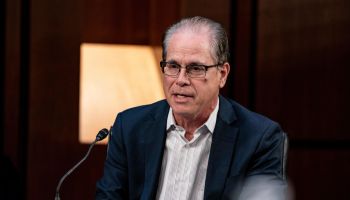WASHINGTON–If Democrats are able to change Senate rules and eliminate the filibuster, it could mean they’d be able to pass a federal election reform bill that Republicans, like Sen. Mike Braun, of Indiana, believe is unconstitutional.
Senate Majority Leader Chuck Schumer, set a deadline of Jan. 17, for a Senate vote on the rules change.
LISTEN: Sen. Mike Braun explains why he doesn’t believe Democrats have the votes
Braun doesn’t believe they have a chance of passing the bill without eliminating the filibuster, because they would need more than 60 votes. Democrats barely have the majority in the Senate. Without the change, it’s likely that two federal voting rights bills, the Freedom to Vote Act and the John Lewis Voting Rights Advancement Act, would fail.
“They’re in almost a weaker spot than they were with ‘Build Back Better’. ‘Build Back Better’ they just had two senators that said enough is enough,” said Braun in an interview from his office in Washington. “Now you’ve got those same two senators. You’ve got Mark Kelly, from Arizona, Jon Tester, from Montana, and maybe a few others.”
Braun said those Democratic senators have recently said they support keeping the filibuster, as recently as three to four years ago. He said that’s why Democrats want to be able to be able to pass the bill with a simple majority. Braun said to accomplish that they would need all 50 Democratic senators to agree to a rules change, which Braun said is also not likely.
Braun said he believes the bill is unconstitutional because elections are supposed to be overseen by states, not by the federal government.
“They’re also talking about an issue that was a non-issue pre-COVID. How many complaints did you hear about access to voting before COVID?” he asked. “How many discussions did you hear even about election integrity until the rules were changed? And, now they want to make those permanent, breach the filibuster, violate the Constitution.”
Braun said even where there are legitimate complaints about elections, it’s up to the states to fix the problem.
“Why would you want to homogenize that across the board in a federal way, where every state’s a little different in terms of what might make sense for them?”
He called the attempt a “bitter political ploy”.
“It’s not gonna work, simply because they don’t have the votes within their own party,” he said.













